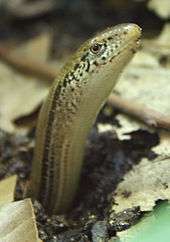Ophisaurus
Ophisaurus (from the Greek 'snake-lizard') is a genus of superficially snake-like lizards in the family Anguidae. Although most species have no legs, their head shapes, movable eyelids, and external ear openings identify them as lizards. A few species have very small, stub-like legs near their rear vents. These are vestigial organs, meaning they once served an evolved purpose but are no longer used. They reach lengths of up to 1.2 metres (4 ft), but about two-thirds of this is the tail. Glass lizards feed on insects, spiders, other small reptiles, and young rodents. Their diets are limited by their inability to unhinge their jaws. Some glass lizards give birth to live young but most lay eggs.
| Ophisaurus | |
|---|---|
| Eastern glass lizard (Ophisaurus ventralis) | |
| Scientific classification | |
| Kingdom: | Animalia |
| Phylum: | Chordata |
| Class: | Reptilia |
| Order: | Squamata |
| Family: | Anguidae |
| Subfamily: | Anguinae |
| Genus: | Ophisaurus Daudin, 1803[1] |
| Species | |
|
6, See text. | |

They are so-named because their tails are easily broken; like many lizards, they have the ability to deter predation by dropping off part of the tail, which can break into several pieces, like glass. The tail remains mobile, distracting the predator, while the lizard becomes motionless, allowing eventual escape. This serious loss of body mass requires a considerable effort to replace, and can take years to do so. Despite this ability, the new tail is usually smaller than the original.
Feeding
Their diets consist primarily of arthropods, with larger animals eating snails and small mammals.
Species
The genus Ophisaurus (sensu lato) contains the following species:[2]
- Ophisaurus attenuatus Baird, 1880 – slender glass lizard
- Ophisaurus ceroni Holman, 1965 – Ceron's glass lizard
- Ophisaurus compressus Cope, 1900 – island glass lizard
- Ophisaurus incomptus McConkey, 1955 – plainneck glass lizard
- Ophisaurus mimicus Palmer, 1987 – mimic glass lizard
- Ophisaurus ventralis (Linnaeus, 1766) – eastern glass lizard
- †Ophisaurus manchenioi - Blain & Bailon, 2019 Mancheno's glass lizard
Nota bene: A binomial authority in parentheses indicates that the species was originally described in a genus other than Ophisaurus.
See also
- American legless lizard
- Pygopodidae
- Slowworm
- Limbless vertebrates
References
- "Ophisaurus". Integrated Taxonomic Information System. www.itis.gov.
- "Ophisaurus ", "Dopasia ", "Hyalosaurus ", "Pseudopus ". The Reptile Database. www.reptile-database.org.
Further reading
- Boulenger GA (1885). Catalogue of the Lizards in the British Museum (Natural History). Second Edition. Volume II. ... Anguidæ ... London: Trustees of the British Museum (Natural History). (Taylor and Francis, printers). xiii + 497 pp. + Plates I-XXIV. (Genus Ophisaurus, p. 279).
- Daudin FM (1803). Histoire Naturelle, Générale et Particulière des Reptiles; Ouvrage faisant suite aux Œuvres de Leclerc de Buffon, et partie du Cours complet d'Histoire naturelle rédigé par C.S. Sonnini, membre de plusieurs Sociétés savantes. Tome septième [Volume 7]. Paris: F. Dufart. 436 pp. (Ophisaurus, new genus, p. 346). (in French).
- Goin CJ, Goin OB, Zug GR (1978). Introduction to Herpetology, Third Edition. San Francisco: W.H. Freeman. xi + 378 pp. ISBN 0-7167-0020-4. (Ophisaurus, p. 293).
External links
| Wikispecies has information related to Ophisaurus |
| Wikimedia Commons has media related to Ophisaurus. |